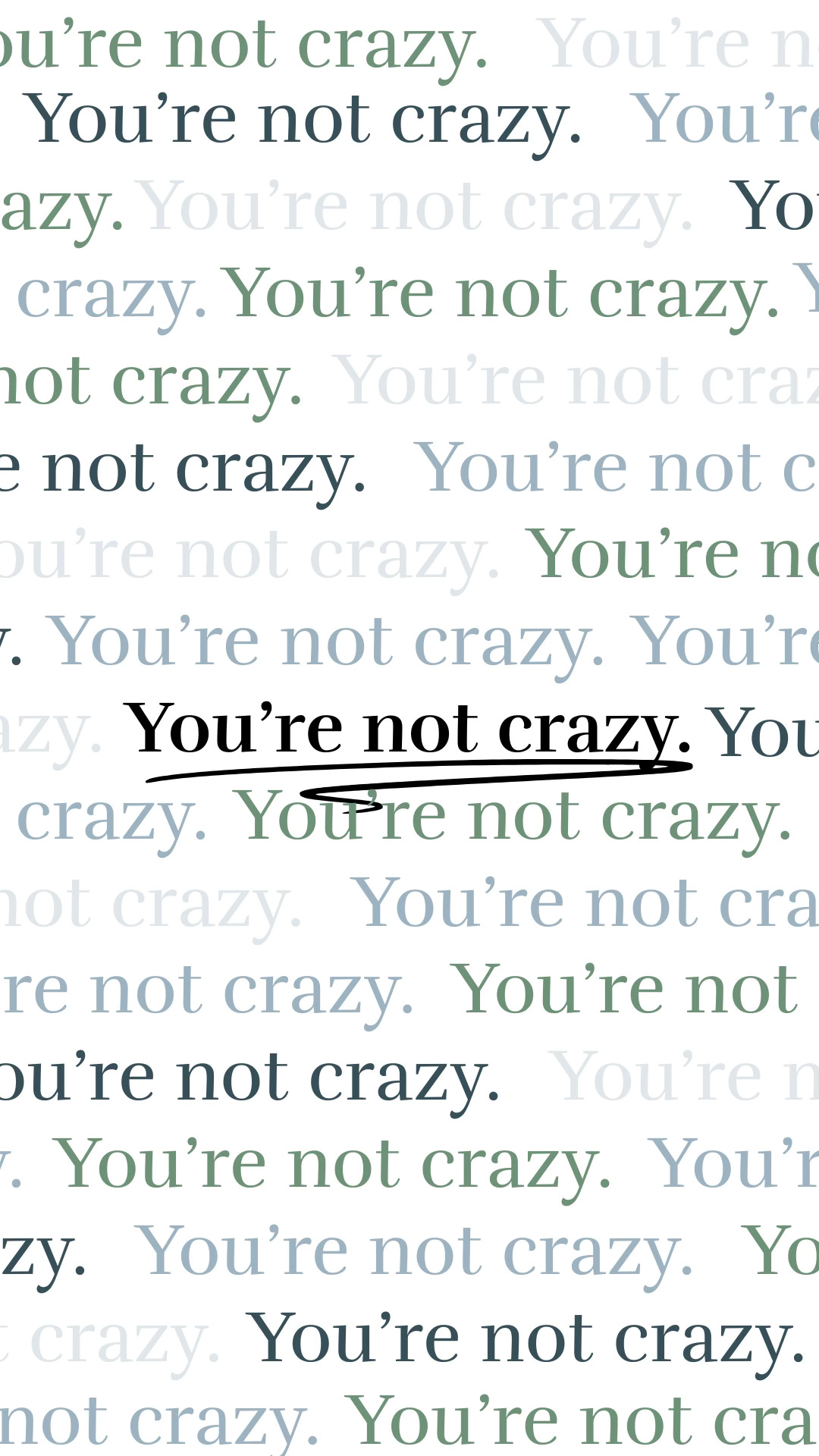“Does This Make Me Crazy?”
What I tell clients when their nervous systems scream, their shame kicks in, and they worry they’re too much.
There’s a new piece of art that I’ve been thinking about adding to my office, based on the conversations I’ve been having with clients. Here’s a rendering of what I was thinking:
I’m not sure how clients would feel about walking into a counseling office for the first time and seeing that on the wall. But go with me - every time a client says to me: “Am I crazy?” or “Do you think I’m crazy?” or “That makes me crazy, right?” Or “Oh my God, I’m crazy,” I’ll just point to the poster on the wall and we’ll try using some different language about ourselves.
I’ll workshop it.
Anyways, “You’re Not Crazy” is the mantra that I say the most often to clients in the counseling room. Whenever I’m working with a new client and they begin to rev up to tell me something that they are confident is going to make me think they’re certifiably nuts, I’ll usually pause them and say something like, “Hey, Jewel Hair Mermaid Barbie1, just a fun fact about me—there’s basically nothing you can say to me that is going to make me think that you’re crazy. So give it your best shot, but that will be my official stance on the issue. Anyways, continue…”
A lot of my clients are women, which is to say that I work with a group of clients who have been conditioned to believe that their narrative and experience is inherently not credible (gee, wonder why?).
I also work with a lot of people (men and women) that sense that their grief, anger, trauma symptoms, and crippling anxiety are so profound that nobody could possibly understand them.
This is partially the result of disenfranchised grief, an experience of loss that is often not widely discussed or normalized, such as infertility, reproductive loss, and religious harm, to name a few.
This is also what happens when we don’t understand trauma.
This is also because while we societally decided that women are emotionally bananas-town at their baseline, we’ve decided that men who experience anything other than anger are wimps while refusing to give them tools to help them regulate and productively express their anger.
Sigh.
Even this past week, I had an experience at church that prompted a very strong internal emotional response (aka. I lost my shit). A person who hasn’t experienced religious trauma probably wouldn’t blink twice at the issue, but my sweet, scared brain read it as dangerous. And because it seemed like it wasn’t a big deal to anybody else, that disoriented feeling made me feel crazy.
This shows up with my clients who have experienced reproductive trauma. For example, when they show up to their OB/GYN for a routine ultrasound, if they’ve experienced a previous loss, their brain and body might go haywire when the doctor starts the exam. Not crazy. Just grieving and scared.
Or if a client has experienced profound abandonment (especially at a very young age), they may perceive conflict with their partner as super ultra scary and go into freak-out hyperdrive mode and maybe shut down, lash out, cry, shake, or panic (we call this “flooding” in Gottman couples counseling). Still not crazy. Just frightened and overwhelmed.
Even if a client were experiencing mental health symptoms like psychosis, suicidal or homicidal ideation, or dissociation to name a few, they still wouldn’t qualify as crazy. We have specific words and research that helps us understand what is happening, and we can help clients decrease their symptoms without judgment.
When a client asks if they’re crazy, in addition to trying to reassure them and care for the symptom that’s causing discomfort, I’m also curious about how much self-doubt, shame, isolation, and fear that they’re experiencing internally. Because when a client thinks they’re crazy, they’re no longer dealing with a distressing sensation or emotion, they’re also probably navigating some pretty mean self-talk. And that part deserves validation and support too.
So, here’s the takeaway: You’re not crazy.
I felt extra kooky this morning, so I made a helpful little phone wallpaper as a reminder if anybody needs it. (Full disclosure: You may get some questions from folks if you have this on your phone, but what a fun conversation starter, right?)
Disclaimer: This essay is intended for educational and informational purposes only. Reading or engaging with this content does not constitute therapy, nor should it be considered professional advice or a substitute for therapy. Everyone’s experiences are unique, so what’s shared here may or may not resonate with you. For more details, please review the full disclaimer on my About page before reading. To learn more about my clinical work, please click here.
Name changed to protect client’s identity.







Great article! Thanks especially for your comments about men and their "crazy" emotions. Good stuff. Spot on!